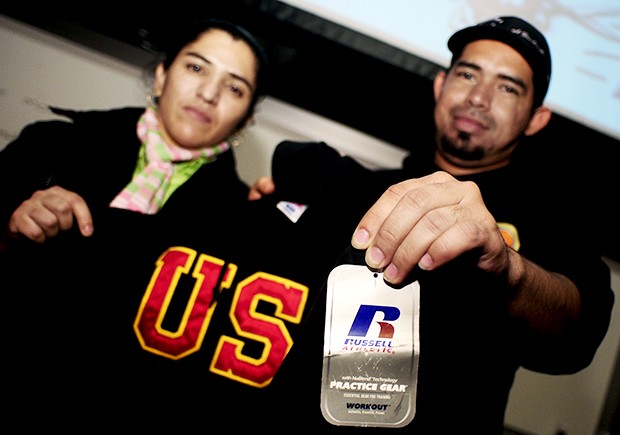Two former factory employees urged the University of Minnesota to sever its ties with Russell Athletic Friday following the closing of their factory in Choloma, Honduras . Moises Elias Montoya Alvarado and Norma Estela Mejia Castellanos were both leaders in the unionizing of Jerzees de Honduras , which makes apparel for multiple universities. The two have been going to universities across the country urging administrations to cut ties with Russell. Although the University of Minnesota has not made a decision about its future relationship with the company, General Counsel Mark Rotenberg sent a letter to Russell demanding answers about the recent allegations. The University gave Russell until Feb. 20 to reply, and the University will act depending on the response, Associate General Counsel Brent Benrud said. The claims from the workers and a Worker Rights Consortium report show that Russell broke the UniversityâÄôs Trademark Licensee Code of Conduct. According to the code, âÄúLicensees shall recognize and respect the right of employees to freedom of association and collective bargaining. No employee shall be subject to harassment, intimidation or retaliation in their efforts to freely associate or bargain collectively.âÄù Employees in the plant earned the equivalent of $60 a week, and when they tried collective bargaining tactics, the plant closed, causing 1,800 people to lose their jobs on Jan. 30. Before and after the closing, both workers said they received death threats from factory management and said anyone involved in the unionizing attempt had been blacklisted from the garment producing industry in Honduras. Castellanos began crying as she said a man personally threatened to follow her home and âÄúcut her head off.âÄù The next day, she told her kids not to go to school because she feared for their lives. âÄúWe were told that we deserve to be bombed and have our heads blown off,âÄù Castellanos said. âÄúThis is the prize we get from these billionaires for giving our work and sweat to the company.âÄù The licensee code also protects workersâÄô rights to form unions and collect a âÄúpremium rateâÄù for overtime, and the two workers said they received no pay for overtime. Russell has been trying to remedy the allegations from a distance. The company claimed economic reasons forced the plant into closing and sent a letter to the University, which Benrud said explained that the workers had received severance packages according to Honduran laws. When Benrud asked the former workers about these claims, Alvarado laughed, and Castellanos said the only package she received were threats. This is not the first time RussellâÄôs actions have been questioned. In 2007 the company fired 140 workers from Jerzees de Honduras citing economic problems, but when universities threatened to cut contracts, the factory hired the workers back, Alvarado said. In addition to breaking multiple universitiesâÄô codes of conduct, both workers said the infractions break Honduran laws, but when they initially asked for pay raises, they realized the country does not protect the rights of garment industry workers. Alvarado said he had originally asked management for a 45 percent raise until he found out the government voted to raise minimum wage 60 percent âÄî except in the garment industry. Following this news, Alvarado said he asked for a raise between 10 percent and 20 percent, but the company said the most it could offer was the equivalent of three cents per week. University of Minnesota-Morris senior Matt Abbott said he will be sending a collection of postcards from students to President Bob Bruininks , urging him to cut the UniversityâÄôs contract with Russell. Abbott, a member of United Students Against Sweatshops and the Minnesota Public Interest Research Group , which both helped bring the workers to speak, said Russell has been diverting attention from the allegations. Abbott said Russell owned the website âÄúReinInRussell.com,âÄù which was shut down last week because it diverted attention from the site âÄúReinInRussell.blogspot.com,âÄù where the two workers discuss their travels and progress with different schools cutting contracts. âÄúStarting this website shows they are afraid of workers speaking out against issues,âÄù Abbott said. Jack Mahoney, a Georgetown University graduate and a former USAS member, translated for the two workers, and said he has been driving around with them to different campuses to help share their stories since the plant closed. Thus far, seven universities have cut their licenses with Russell, including the University of Wisconsin-Madison and most recently the University of Washington. The workers want universities to cut their contracts with the hope that the loss of business will force Russell into reopening the plant in Honduras. âÄúWeâÄôll continue to hope that this University will take action to remedy the situation of our unemployed workers in Honduras,âÄù Montoya said.

Image by Chris Roberts
Norma Estela Mejia Castellanos, left, and Moises Elias Montoya Alvarado display the kind of shirt they make in the Honduras factory where they were formerly employed. They spoke Friday of how their attempts to unionize the workers resulted in the factory closing.
Former Russell employees speak out against company
The employees said factory management threatened their lives.
Published February 15, 2009
0

